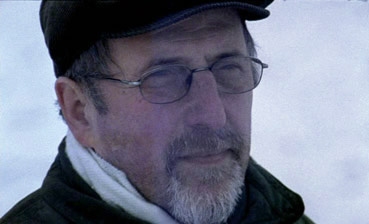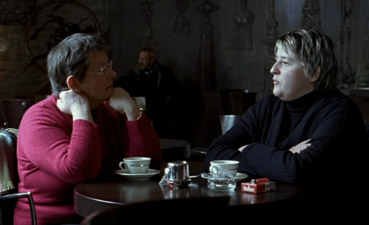|
On the evening of 13th September 2002 in the French city
of Rheims, three skinheads went out for a bit of fun. Their
idea of fun. Their plan was to find an Arab and kill him.
Fortunately for the local Arabic population, they had no
luck. Unfortunately for young, self-assured François
Chenu, they decided to target a gay man instead. François
was walking in a park, minding his own business, when the
three attacked him. Instead of cowering or running away,
he stood up for himself and called them cowards. Their response
was to beat him so badly that his sister could later only
identify him by his hair extensions. They then threw his
unconscious body into a pond and he drowned.
I
see no reason to sit on the fence or act all neutral on
this. As far as I'm concerned, those who judge people on
the basis of their race, their gender or their sexual orientation do so out of
ignorance. They may be misinformed, they are almost certainly
generalising, but it's ignorance nonetheless. Those who
actually claim to hate someone for the same are not just
ignorant, they are stupid, and if that hatred mutates into
a desire to kill, then you're out of the realms of stupidity
and into the psychotic. An individual harbouring such desires
is dangerous not just to the unfortunates in their target
zone but to society at large. I'm aware that social conditioning
and family and peer pressure play their very considerable
part, but try telling that to someone whose son or brother
has been murdered purely because of the colour of their
skin or because they don't fancy women. I hear too many
stories of assaults committed by the intolerant, usually
in groups, against individuals they despise for being different
to them, and it always sickens me.

Filmed
two years after François' murder in the run-up to
the trial of his three assailants, Olivier Meyrou's compelling
and moving documentary makes no attempt to investigate or
explain such attitudes or behaviour, concentrating solely on what losing someone to an assault provoked by
such attitudes does to the immediate family of the victim.
Meyrou's approach is a minimalist one that is nonetheless
gripping, intimate, and at times heartbreaking, as his carefully
framed camera eavesdrops on conversations held by family
members with each other or their lawyer, later expanding
to include the legal representatives of both sides and even
reporters. In the most gut-wrenching sequence, a single
static, late evening shot of the park in which the attack
took place is accompanied by the voice of François'
sister Isabelle as she recalls her drive to identify a body
that she was desperately hoping would not be that of her
missing brother, and how she reacted to what she was confronted
with. Every held-in-check flicker of emotion and every slow
intake of breath tells its own story. And it hurts.
It hurts because you not only feel for what she went through
but because you put yourself in her place, and it would
be a heartless viewer who will not by the end of the sequence
be imagining how they would react to the prospect of seeing
a loved one of their own lying in the morgue at the end
of that journey.
Meyrou's
purpose here is clear, to reach past that perhaps casual
prejudice that prevents a proportion of the straight audience
from completely empathising with the plight of a gay victim
and instead talk to something that we can all relate to. He asks
us directly: how would you feel if this was your son?
The unusual decision not to even include a photograph of
François (or, as it happens, the three attackers)
further focuses our attention on those left behind and on
the effect such a loss has on them. François' parents in particular
display a dignity and strength I'm not sure I could muster
in their situation, their desire to move forward from the
negative emotions that the incident has awakened in them
reflected in a title that whose sense of hope is both personal
and societal.
Beyond
Hatred is a sad, upsetting but compellingly made
and moving documentary that I can only hope reached its
target audience in its native France. As a subtitled French
language film, it is unlikely to be seen here by the very
people who would most benefit from watching it, but it is
one that I would urge the sympathetic to see, in part to strengthen
their resolve to directly combat the sort of prejudice that
provides the early groundwork for such wretched crimes.
And the next time a friend or relative makes an even offhand
homophobic remark, sit them down, by force if necessary,
and show them this film, so that they might begin to understand
what such attitudes, however casually expressed, can ultimately
lead to.
The
anamorphic 1.66:1 transfer on the Peccadillo disc is for
the most part a pleasing one, given that the film was shot
on Super-16 in available light and not always ideal conditions.
Colours are sometimes a little muted and shadow detail is lost
when the light levels are low, but elsewhere the image has
a very natural look to it, and the level of detail is good
throughout. There is inevitable film grain visible on much
of the footage, and occasionally there is some visible but
rare compression banding on single colour walls.

The
French Dolby 2.0 stereo soundtrack is very clear throughout
and has a good dynamic range, reflecting some fine location
sound recording (conversations held some distance from the
camera are cleanly captured) and impressively reproducing
the sad strings of François-Eudes Chanfrault's emotionally
tuned score.
Interview
with director Olivier Meyrou (17:56)
A very useful interview, conducted in English, in which
the director Meyrou outlines the long process of preparing
the film and gaining the trust of those involved, explains
his reasons for not including pictures of either François
or his attackers, and provides a useful postscript to the
film's poignant and hopeful final scene. There's plenty
more here of interest, and it's a welcome inclusion.
There
are also Trailers for a number
of other Peccadillo releases.
A
powerful and sensitive look at the consequences of hate
crime that nonetheless ends on a note of hope, rightly suggesting
that hatred and ignorance are not a lifelong trap, but one
that anyone can be freed from with understanding and enlightenment.
It's a film that deserves to be widely seen, especially
by those who unconsciously throw up a mental barrier when
words like gay or homophobia are linked to any news story.
Recommended.
|